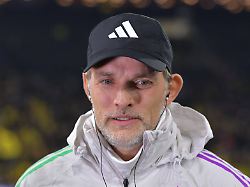Thomas Tuchel’s attack on Didi Hamann and Lothar Matthäus on Saturday evening caused a sensation. Understandably, there is now speculation as to why the Bayern coach was so upset. But there is actually a fairly simple explanation for this – especially with regard to his biography.
It was after the third matchday of the 2012/13 season when Thomas Tuchel attacked a small circle of journalists head-on in tranquil Mainz. His team had just lost in Munich and was looking pretty dismal with just one point after three games. For Thomas Tuchel, the moment to set some things straight, because in his opinion the media was largely to blame for his team’s poor position in the table.
The journalists had created completely false expectations. Now it was up to him to have a real talk – with the people who, in his opinion, were the main culprits in his current personal situation being so bad. After an hour of frontal attack, Tuchel concluded in a much more relaxed manner with the words: “I see heads shaking, eyebrows rising. I’m just saying my opinion, I thought you’d be interested in that!”
Basically, the Bayern coach’s attack on the two TV experts Didi Hamann and Lothar Matthäus in the last few days couldn’t really surprise anyone. Such outbursts are part of the vita of the man whom companions often describe as choleric and resentful. Nevertheless, Tuchel’s verbal attacks on Hamann and Matthäus in particular and the media in general must of course be questioned. Because the timing and intensity surprised not only the football fans – who, by the way, celebrate Tuchel’s attacks as a strong and correct sign in a significant number – but also long-time observers of the record champions’ coach. Many people ask themselves why now and why in this sharpness and clarity?
Tuchel: “I am also very sad, very angry”
The assumptions and speculations are varied, but the reason for Tuchel’s outbursts is probably much more obvious than one might first think. Similar to 2012, Thomas Tuchel currently feels that his work is being hindered from outside sources. The week before last, Friday before the game against SV Darmstadt 98, the Bayern coach tried to get the matter out of the way when he said about Hamann’s publicly expressed criticism: “Didi is getting a little out of hand at the moment, I have the feeling and on the other hand it is certainly not important enough for us to care about it, react to it or let ourselves be annoyed.” And the 8-0 win against the Lilies, Tuchel apparently believed, should have calmed things down further. But then came the DFB Cup game in Saarbrücken – and the end in the 96th minute.
- Ben Redelings is a best-selling author and comedian from the Ruhr area.
His current book “60 Years of the Bundesliga. The Anniversary Album” is a modern classic from the publisher “The workshop”
He travels all over Germany with his football programs. Information & dates www.scudetto.de.
On that memorable Saturday evening, Thomas Tuchel only showed his professional, calm side in an interview before the game at Borussia Dortmund. Before the encounter, a young reporter interviewed him. And he also spoke to him about the defeat in the cup. Tuchel reached out and said sentences that are very important in the context of the events that followed that evening. Because Tuchel said: “Yes, I am also very sad, very angry. Every defeat makes me sad. I can’t sleep, I sleep very badly, very little.” And: “It was our first defeat of the season, it hurts a lot because it was in the cup.”
Thomas Tuchel had actually wanted to sit it out with Hamann and Matthäus, but then the story of the cup exit got in the way. The Bayern coach was angry. And in all probability also to a considerable extent on himself. His strategy for the game against Saarbrücken had not worked – but he didn’t say that after the game. Instead, he spoke of “winning together and losing together.” And then he said that it certainly wasn’t the last defeat of his career, “even though we all hate losing.” But the anger that Tuchel felt was channeled towards Hamann and Matthäus just two days later, when he said about them in a supposedly humorous post as a return coach: “I don’t see any further development with these two either.”
It worked in Mainz then and now?
It is and was the same knitting pattern as almost eleven years before. The culprit for the misery wasn’t him – it was once again the media, which had intervened in Tuchel’s work from outside. Tuchel will have suspected that the frontal attack, unlike back then in tranquil Mainz, had a different explosive impact in the media this time, to put it mildly – but Thomas Tuchel can and was able to see the lasting consequences of his attack on Didi Hamann and Lothar Matthäus don’t foresee.
The media scolding worked in Mainz back then. It only brought the team and the coach closer together. It remains to be seen whether this will work this time with the great record champions and the completely different media world in Munich and nationwide. Because as Stefan Effenberg rightly said, after this weekend nothing is “calmed down and cleared up”. Quite the opposite. The whole thing is probably moving into the next round now. And so Thomas Tuchel’s grotesque and so easily transparent diversionary maneuver could ultimately backfire. Unless FC Bayern wins every game from now on. The record champions’ coach would certainly not mind being able to sleep peacefully and long-term in the future.
